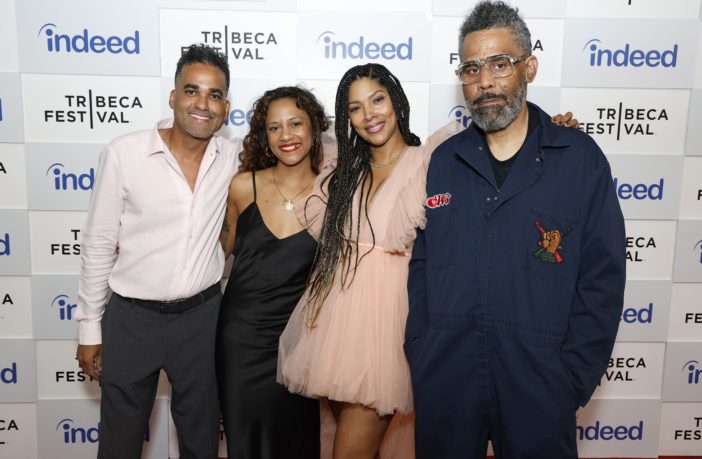It’s no coincidence Black films have become especially plentiful at the Tribeca Festival. That’s precisely the intention of the festival’s “Expressions of Black Freedom” program which just wrapped its third year. Sponsored by Indeed, the spotlight program commemorates Juneteenth and this year it and the festival at large got an extra push from the 50th anniversary of hip hop.
But being present wasn’t simply enough for Tribeca Festival’s senior programmer Faridah Gbadamosi who took the reins of this year’s offerings when she joined the team in September. “They had already done Juneteenth programming over the last two years, and we were kind of discussing what we do next,” explains the New York native who actually attended festival, famously co-founded by Robert DeNiro, in her youth and made a huge impact during her time as artistic director of Outfest.
“I really wanted us to have a conversation about why it’s called “Expressions of Black Freedom” and how we move beyond curating what the Black experience is to curating within it,” she continues. “So instead of saying ‘this is what Blackness looks like or this is what Black programming is,’ how do we, within all of our Black programming, tell a specific story within it the same way we tell specific stories of like comedy?”
Guided by that mission, Gbadamosi and her team asked, “‘how do we define what ‘Black freedom’ is and capture essentially the spirit of Juneteenth?’ We wanted to do it thematically, so this year we decided to do it through Black music. So using Black music, [we asked]how do we look at different films, media in general, to define what Black freedom could look like, both individually and within the community?”
To help them achieve that vision, they tapped the legendary Fab 5 Freddy, who rose to national acclaim in 1988 as the first host of the groundbreaking American version of Yo! MTV Raps, to co-curate. Fab 5 Freddy is a “massive film aficionado” who not only regularly attends the Tribeca festival, but he is also friends with its CEO Jane Rosenthal. Because New York City is both hip hop and Tribeca’s place, they wanted to “look at the ways in which we can speak truth to power,” they wanted to center that energy and Fab 5 Freddy was key in that, Gbadamosi says.
“He came in and he had just a wealth of information about the space, like how hip hop grew, what movies we should look at when we were looking at retrospectives. He was really great to work with and helped us shape our programming,” she reports.
While music was a rallying theme, how that looks is not only music. “We also wanted to do a focus on diversity,” she shares. “The other thing we wanted to take into account is: if we’re really telling a different story, we wanted it to feel like we were covering different facets of ways of expressing yourself and being yourself.”
Ultimately, she says the 2023 Tribeca Festival was meant to feel like “you’re going on a journey.”
Highlights from the festival are numerous and include several world premieres like The Blackening, Gabrielle Union’s Audience Award-winning May-December romance film The Perfect Find, and Cinnamon, starring Damon Wayans, Pam Grier, and Raising Kanan’s Hailey Kilgore for Tubi, both streaming June 23. Among the most notable Black Music Month highlights are director Sacha Jenkins’ Biz Markie documentary All Up in the Biz for Showtime; the Shaggy-produced Bad Like Brooklyn Dancehall exploring the influential New York borough’s pivotal role in the genre’s expansion;, and Uncharted, the Alicia Keys-produced documentary taking a behind-the-scenes look at the multi-platinum artists female-focused She Is the Music songwriting camp.
New Jack City and How Stella Got Her Groove Back ruled the film retrospectives with Mario Van Peebles, Vanessa Williams Michael Michelle and Angela Bassett in featured conversation about their respective films. Several panel discussions exploring diversity and representation included Black on Set: Exploring Diversity Behind the Lens from AT&T’s Dream in Black initiative and Masterclass: The Dream Team—Careers in Talent Representation hosted by the Blackhouse Foundation and Diverse Representation.
Because not everyone could experience the festivities in person, there is a virtual Tribeca at Home sampling of the films, with a value pass priced at $150 pass, until July 2.
Ultimately, the intention, shares Gbadamosi, was to make you feel like “you’re going on a journey.” And she hopes this year’s trip was one well-worth the ride.
Ronda Racha Penrice is the author of Black American History For Dummies and editor of Cracking The Wire During Black Lives Matter.



